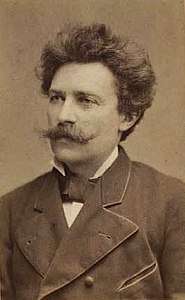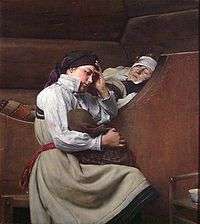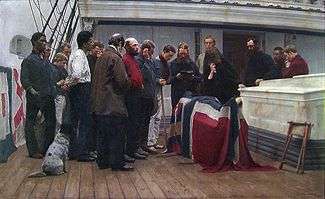Carl Sundt-Hansen
Carl Fredrik Sundt-Hansen (30 January 1841, Stavanger - 27 August 1907, Stavanger) was a Norwegian-Danish genre painter; in the Romantic Nationalist style. He adopted his mother's maiden-name (Sundt) in 1878.

(before 1900)
Biography
He came from an old family of wealthy merchants. His father was Danish and served as a militia officer. Originally, Carl was meant to take over the family business, "Plough & Sundt", but he preferred to become and artist, so he handed the business over to his younger brother, Hans Wilhelm.[1] His father was interested in the arts and had helped establish a local theater, so he encountered little opposition.
In 1859, he went to Copenhagen, where he studied at the Royal Danish Academy of Fine Arts and a private school operated by Frederik Ferdinand Helsted. He took lodging with one of his professors, but chafed under the strict oversight.

After two years, he transferred to the Kunstakademie Düsseldorf. Although his fellow Scandinavians, Adolph Tidemand and Hans Gude were teaching there, he studied with the Swiss painter, Benjamin Vautier.[1] In 1864, he sent his first painting home, where it was shown at an exhibit by the Oslo Kunstforening and was well received. One of his landscapes was purchased by King Charles IV.
In 1866, he moved on to Paris; drawing inspiration from the works of Meissonier and Delaroche.[1] When King Charles visited the Exposition Universelle (1867), he was so impressed by Hansen's work that he awarded him the Order of Vasa. He stayed in Paris until 1871, when he returned to Norway by way of Düsseldorf. His intention was to establish a studio in Oslo, but the art market there was unpromising, so he began to travel. He eventually came to rest in Stockholm, and remained there until 1882.[1]
That year, an economic crisis precipitated by the Paris Bourse Crash forced the family business to declare bankruptcy. The income from his paintings was insufficient, as he was a slow worker and produced little so, in an attempt to improve his situation, he moved to Copenhagen.[1] His brother, Wilhelm, was ruined and his wife, the artist Frida Hansen, had to be the family's support.

In 1889, he became a Danish citizen and was admitted to the Royal Academy as a full member. During this period, his paintings became larger and his subject matter lighter. Many of those works are nearly photographic in detail. He lived in Copenhagen until 1896, when he went back to Norway and settled into a small cabin in Valle.[1]
In 1907, he became ill with what was diagnosed as nicotine poisoning. Nothing worked to improve his health, so he went to a hospital in Stavanger, where it was discovered that he had cancer. For the last few months of his life, he lived in Stavanger with his brother, Hans.
References
- Brief biography @ the Norsk Kunstnerleksikon.
Further reading
- Hild Sørby, Carl Sundt-Hansen 1841–1907, Stavanger Lithografiske Anstalt, 1976 ISBN 82-990430-1-8
External links
| Wikimedia Commons has media related to Carl Sundt-Hansen. |
- ArtNet: More works by Sundt-Hansen.
- Carl Sundt-Hansen @ the Kunstindeks Danmark